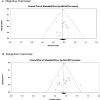A Systematic Review and Meta-analysis of the Effects of Meditation on Empathy, Compassion, and Prosocial Behaviors - PubMed (original) (raw)
A Systematic Review and Meta-analysis of the Effects of Meditation on Empathy, Compassion, and Prosocial Behaviors
Christina M Luberto et al. Mindfulness (N Y). 2018 Jun.
Abstract
Increased attention has focused on methods to increase empathy, compassion, and pro-social behavior. Meditation practices have traditionally been used to cultivate pro-social outcomes, and recently investigations have sought to evaluate their efficacy for these outcomes. We conducted a systematic review and meta-analysis of meditation for pro-social emotions and behavior. A literature search was conducted in PubMed, MEDLINE, PsycINFO, CINAHL, Embase, and Cochrane databases (inception-April 2016) using the search terms: mindfulness, meditation, mind-body therapies, tai chi, yoga, MBSR, MBCT, empathy, compassion, love, altruism, sympathy, or kindness. Randomized controlled trials in any population were included (26 studies with 1,714 subjects). Most were conducted among healthy adults (_n_=11) using compassion or loving kindness meditation (_n_=18) over 8-12weeks (_n_=12) in a group format (_n_=17). Most control groups were wait-list or no-treatment (_n_=15). Outcome measures included self-reported emotions (e.g., composite scores, validated measures) and observed behavioral outcomes (e.g., helping behavior in real-world and simulated settings). Many studies showed a low risk of bias. Results demonstrated small to medium effects of meditation on self-reported (SMD = .40, p < .001) and observable outcomes (SMD = .45, p < .001) and suggest psychosocial and neurophysiological mechanisms of action. Subgroup analyses also supported small to medium effects of meditation even when compared to active control groups. Clinicians and meditation teachers should be aware that meditation can improve positive pro-social emotions and behaviors.
Keywords: compassion; empathy; meditation; mindfulness; pro-social.
Conflict of interest statement
Conflict of Interest: The authors have declared that they have no conflict of interest.
Figures
Figure 1
Flowchart of article selection process
Figure 2
Risk of bias across all studies
Figure 3. Effects of meditation on objective and subjective outcomes
Note. SDM, standardized difference in means; CI, confidence interval; LL, lower limit; UL, upper limit.
Figure 4
Funnel plots for objective and subjective outcomes
Similar articles
- A wait-list randomized controlled trial of loving-kindness meditation programme for self-criticism.
Shahar B, Szsepsenwol O, Zilcha-Mano S, Haim N, Zamir O, Levi-Yeshuvi S, Levit-Binnun N. Shahar B, et al. Clin Psychol Psychother. 2015 Jul-Aug;22(4):346-56. doi: 10.1002/cpp.1893. Epub 2014 Mar 16. Clin Psychol Psychother. 2015. PMID: 24633992 Clinical Trial. - Training Emotion Cultivates Morality: How Loving-Kindness Meditation Hones Compassion and Increases Prosocial Behavior.
Bankard J. Bankard J. J Relig Health. 2015 Dec;54(6):2324-43. doi: 10.1007/s10943-014-9999-8. J Relig Health. 2015. PMID: 25633082 Review. - The effects of loving-kindness and compassion meditation on life satisfaction: A systematic review and meta-analysis.
Gu X, Luo W, Zhao X, Chen Y, Zheng Y, Zhou J, Zeng X, Yan L, Chen Y, Zhang X, Lv J, Lang Y, Wang Z, Gao C, Jiang Y, Li R. Gu X, et al. Appl Psychol Health Well Being. 2022 Aug;14(3):1081-1101. doi: 10.1111/aphw.12367. Epub 2022 May 9. Appl Psychol Health Well Being. 2022. PMID: 35532366 Review. - Folic acid supplementation and malaria susceptibility and severity among people taking antifolate antimalarial drugs in endemic areas.
Crider K, Williams J, Qi YP, Gutman J, Yeung L, Mai C, Finkelstain J, Mehta S, Pons-Duran C, Menéndez C, Moraleda C, Rogers L, Daniels K, Green P. Crider K, et al. Cochrane Database Syst Rev. 2022 Feb 1;2(2022):CD014217. doi: 10.1002/14651858.CD014217. Cochrane Database Syst Rev. 2022. PMID: 36321557 Free PMC article. - Effect of kindness-based meditation on health and well-being: a systematic review and meta-analysis.
Galante J, Galante I, Bekkers MJ, Gallacher J. Galante J, et al. J Consult Clin Psychol. 2014 Dec;82(6):1101-14. doi: 10.1037/a0037249. Epub 2014 Jun 30. J Consult Clin Psychol. 2014. PMID: 24979314 Review.
Cited by
- Assessing self-criticism and self-reassurance: Examining psychometric properties and clinical usefulness of the Short-Form of the Forms of Self-Criticizing/Attacking & Self-Reassuring Scale (FSCRS-SF) in Spanish sample.
Navarrete J, Herrero R, Soler J, Domínguez-Clavé E, Baños R, Cebolla A. Navarrete J, et al. PLoS One. 2021 May 24;16(5):e0252089. doi: 10.1371/journal.pone.0252089. eCollection 2021. PLoS One. 2021. PMID: 34029355 Free PMC article. - Can Mindfulness Help to Alleviate Loneliness? A Systematic Review and Meta-Analysis.
Teoh SL, Letchumanan V, Lee LH. Teoh SL, et al. Front Psychol. 2021 Feb 25;12:633319. doi: 10.3389/fpsyg.2021.633319. eCollection 2021. Front Psychol. 2021. PMID: 33716901 Free PMC article. - Predicting Individual Preferences in Mindfulness Techniques Using Personality Traits.
Tang R, Braver TS. Tang R, et al. Front Psychol. 2020 Jun 18;11:1163. doi: 10.3389/fpsyg.2020.01163. eCollection 2020. Front Psychol. 2020. PMID: 32625133 Free PMC article. - Creating mindful heroes: a case study with ninth grade students.
Nogueira I, Barbosa MR, Ribeiro LM, Xenophontos I, Zimbardo P. Nogueira I, et al. Front Psychol. 2023 May 9;14:1091349. doi: 10.3389/fpsyg.2023.1091349. eCollection 2023. Front Psychol. 2023. PMID: 37228340 Free PMC article. - Testing the Efficacy of a Multicomponent, Self-Guided, Smartphone-Based Meditation App: Three-Armed Randomized Controlled Trial.
Goldberg SB, Imhoff-Smith T, Bolt DM, Wilson-Mendenhall CD, Dahl CJ, Davidson RJ, Rosenkranz MA. Goldberg SB, et al. JMIR Ment Health. 2020 Nov 27;7(11):e23825. doi: 10.2196/23825. JMIR Ment Health. 2020. PMID: 33245288 Free PMC article.
References
- Asuero AM, Queraltó JM, Pujol-Ribera E, Berenguera A, Rodriguez-Blanco T, Epstein RM. Effectiveness of a mindfulness education program in primary health care professionals: A pragmatic controlled trial. Journal of Continuing Education in the Health Professions. 2014;34(1):4–12. doi: 10.1002/chp.21211. - DOI - PubMed
- Benson H. The relaxation response: therapeutic effect. Science. 1997;278(5344):1693–1697. Retrieved from http://www.jstor.org/stable2894939. - PubMed
- Bibeau M, Dionne F, Leblanc J. Can compassion meditation contribute to the development of psychotherapists’ empathy? A review. Mindfulness. 2016;7(1):255–263. doi: 10.1007/s12671-015-0439-y. - DOI
Grants and funding
- F32 AT000051/AT/NCCIH NIH HHS/United States
- K24 AT009465/AT/NCCIH NIH HHS/United States
- K24 CA197382/CA/NCI NIH HHS/United States
- T32 AT000051/AT/NCCIH NIH HHS/United States
LinkOut - more resources
Full Text Sources
Other Literature Sources
Miscellaneous



